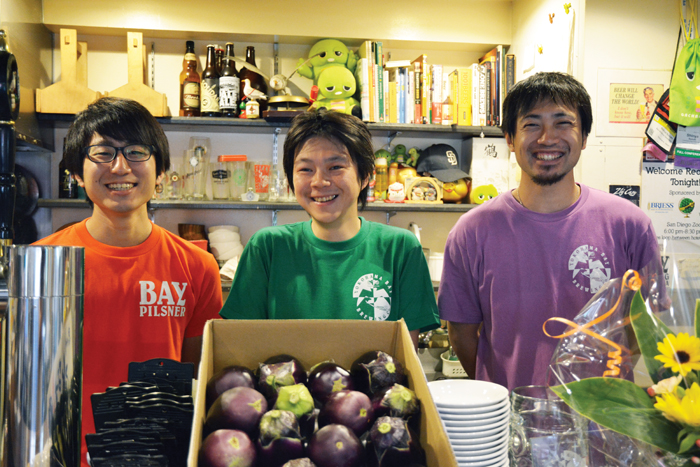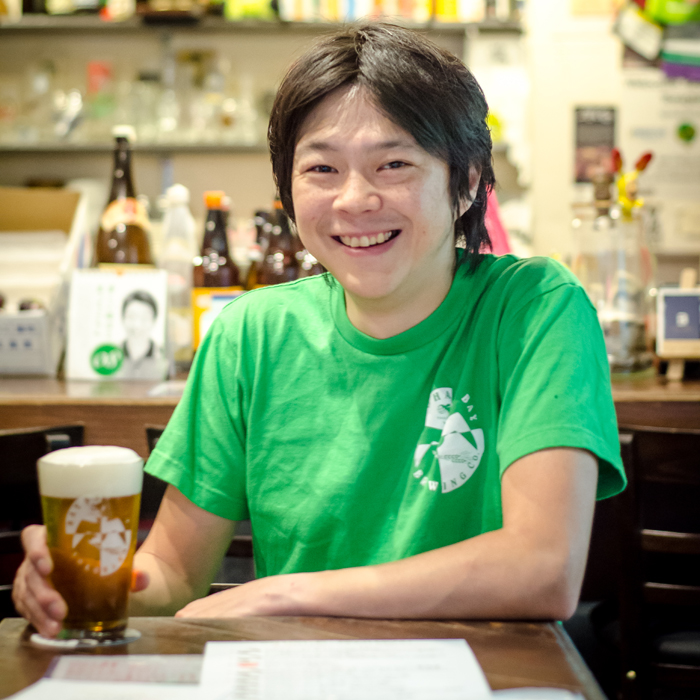He’s won a major brewing award in the Czech Republic. He’s been featured on a Japanese television documentary and been the focus of considerable media attention. The founder of Yokohama Bay Brewing, Suzuki Shinya, is also making his second appearance in this magazine–the first was when, slightly before launching, he offered aspiring readers practical advice on opening a brewery. That was over four years ago and now we find ourselves wondering what new dreams Suzuki is on the cusp of realizing.
Let’s first take a look back at Suzuki’s fateful encounter with beer. Some fifteen years earlier when he was a university student he discovered how delicious beer could be outside the industrial pilsners he was accustomed to. A friend lured him away by saying, “Let’s go drink some really good brews,” and took him to Gotemba Kogen Beer. The array of styles was completely new to him and he took a liking to the weizen in particular.
Following graduation he had a brief stint as a bicycle messenger, but one day while watching NHK’s program “Curious about the World,” he saw a segment about Brauerei Schmitt in Singen, Germany. There was just one brewer there who was, by necessity, handling all the labor of the brewery. “I had no idea there was this kind of work,” Suzuki mused. “I wanted to give it a try. I wondered if there was some place in Japan I could work.” His search began. “I was prepared to do anything to become a brewer,” says Suzuki. Weaving through the streets of the Kanto area on his bicycle, he made the rounds of nineteen breweries, delivering his resume to each. In the end, Yokohama Brewery, in his hometown, brought him on board.
In his second year of working at the brewery, he discovered the beer he would eventually strive to make. A company that was importing and distributing hops and other products was bringing in a keg of the Czech Republic’s Pilsner Urquell about once a year. Suzuki had a sip and was smitten. Unfortunately, he had no idea how to make a beer with such great flavor. The following year, through an introduction from that importer, he paid a visit to the brewery. His connection with the Czech Republic thus began.
That same year, he became the brewmaster at Yokohama Brewery and immediately took advantage of an opportunity to visit the aforementioned Brauerei Schmitt, whose lone brand is a pilsner. Its bouquet-like aroma is unique and quite wonderful. Desperate to make off with the secret technique behind making such a beer, Suzuki called on the brewery again and again, but to no avail. “Although he was willing to let me see the process, the brewer wouldn’t talk to me at all. Once when I visited the brewery, he actually just started chopping wood!” The journey was a dead end, but a new one was about to start.
“Sure, I wanted to make beer and did become a brewer, but at the same time, I realized that I wanted to have my own brewery in the future–at the very least in my 30s. So I actually quit Yokohama Brewery when I was 29 and went out on my own after I turned 30.”
At first he wanted to build a brewery much bigger than the one he has now. In the end he opted for one in the center of the city with a dining space. His business model counted on the profits coming from the food after beer covered expenses. Together, the brewery and dining space are actually only a little more than 30 square meters each–truly a tiny brewpub in the city. According to Suzuki, he would have needed ¥40 million (about USD$330,000 as of 9/2015) to build and open a brewery with proper equipment. Instead he went out and repurposed old dairy tanks and other useful equipment to keep his costs down. He was able to open with initial funds of about ¥20 million.
While managing both the brewery and the dining space, he also found the time to get away to the Czech Republic another four times. To learn how to make a true Bohemian Pilsner (the Western Czech way), he even studied the technique of decoction mashing for three weeks while there. Starting in 2011, he participated as a judge in the annual Gold Brewers Seal competition in Tábor. In 2014, the competition had roughly 300 judges from 170 breweries and 20 countries with some 800 entries. Suzuki’s Bay Pilsner was one of those entries and he ended up taking home a gold medal.
Suzuki brought the concept behind this interesting competition to Japan in 2013 and launched the annual Japan Brewers Cup and Festival at Osanbashi Hall, Yokohama. What makes it so interesting is that while at the same time the festival is taking place, the judges are lined up on a stage at the front of the venue, marking their scores, just as it’s done at the Gold Brewers Seal. Although Suzuki held the original event in April, it has since become a regular January event. The next will be held January 29th through 31st. The 2015 iteration took place over three days and attracted some 6,400 people, while the number of brands served was 71, up from 49 the first year and 67 the second.
More recently, Suzuki is making great strides toward opening a new brewing facility. Financing for the project and applications for public funding are moving forward and he hopes to begin construction in 2016. Since he hasn’t augmented his small system since he launched, he has been contract brewing his Bay Pilsner at larger breweries. He has already brewed at Nihonkai Club (Ishikawa Prefecture) and Hitachino Nest Beer (Ibaraki Prefecture), and has been making beer this year at Gotemba Kogen Beer–the place where he discovered the delicious range that beers could achieve.
“At the new brewery, I plan to only brew pilsners, while at my current one, I’ll continue to make an array of styles, just as I have been doing,” says Suzuki. It was originally his plan to accumulate enough funds for a production brewery by producing and selling ales, which have a shorter fermentation period than lagers. Bay Brewing certainly performed well and grew its revenue, but it just wasn’t enough to pile up the funds necessary to build a production facility. He began contract brewing his pilsner and also bottling and kegging as a way to increase his profits. Bottle sales kicked off in June from his brewpub and also the Red Brick Building in Yokohama. He can also fill purchases via e-mail or fax. Suzuki is currently considering plans to open a taproom for the beer he makes at the new production facility.
One way to positively describe his Bay Pilsner in easy-to-understand terms is by comparing its substantial, but not overwhelming, malt and hop aroma to Sapporo’s Yebisu. That’s where its appeal lies. Its alcohol content is a little lower, too, allowing for continued rounds. Bay Pilsner is Suzuki’s flagship beer, but he has other beers that are regularly a part of his brewing rotation, including his Bitter, Bay Weiss and Iwasaki IPA, which uses barley grown in Yokohama.
Yokohama Bay Brewing is currently brewing just 12 kiloliters of beer a year, but with the 42 contract brewed at Gotemba, the total comes to 54 kiloliters. To receive a beer-brewing license for his new facility, as opposed to a license for beer with additives (like fruit or spice), which Suzuki currently has for his brewpub, he needs to cross the 60 kiloliter threshold. He’s inching closer and closer by the month.
Suzuki’s list of accomplishments continues, including brewing the official beer for the Yokohama DeNA Bay Stars (the city’s professional baseball team), which is sold at Yokohama Stadium. He also participates in an array of events and the throngs that visit Yokohama Bay Brewing only grow each year. Suzuki enlists help from two other employees. Nakamura Akio joined him in 2013, after a stint at the chain pub 82 Alehouse where he learned about craft beer from guest brews the shop occasionally had on tap. His job involves basically anything that needs to be done, including some brewing. The other employee is Miyano Ryota, who worked at a bicycle maker in the Kansai region before discovering craft and telling himself, “I want to make this, too.” He subsequently moved to Yokohama to join Suzuki.
This past April, Suzuki officially incorporated his business and also shifted to year-round hours. The brewpub is located within walking distance of JR Kannai Station or a little longer jaunt from Sakuragicho Station. Access from the closet bullet train station, Shin-Yokohama, is convenient, too, so if you’re traveling to Yokohama, definitely pay a visit. In fact, make a habit of visiting. Each time you’ll no doubt notice just how much Suzuki is moving forward with his dreams.
This article was published in Japan Beer Times # () and is among the limited content available online. Order your copy through our online shop or download the digital version from the iTunes store to access the full contents of this issue.





